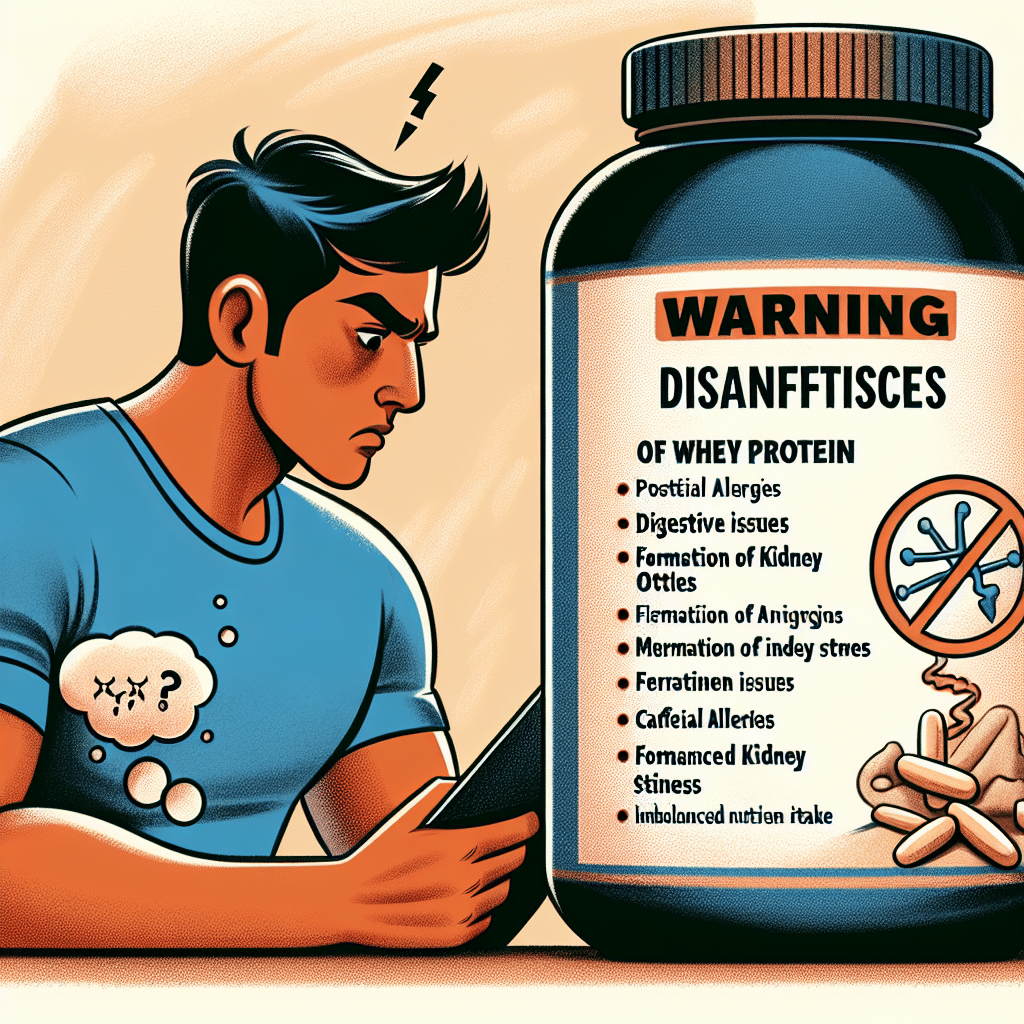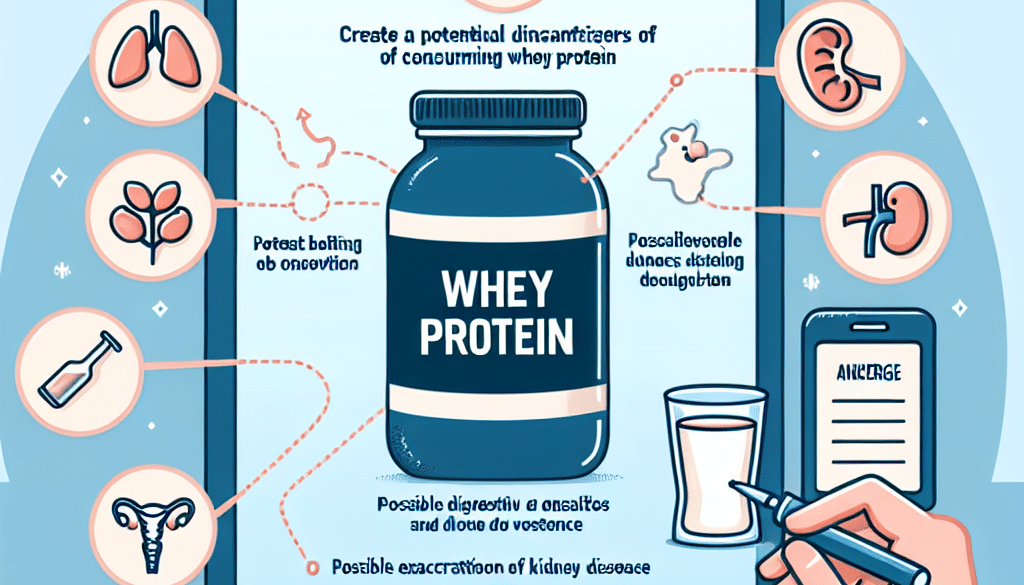Is There Any Disadvantages Of Whey Protein?
-
Table of Contents
- Whey Protein: Understanding the Potential Disadvantages
- Potential Digestive Issues
- Allergic Reactions and Intolerances
- Impact on Kidney Function
- Unwanted Weight Gain
- Interference with Nutrient Absorption
- Artificial Additives and Sweeteners
- Environmental and Ethical Concerns
- Conclusion
- Explore ETprotein’s High-Quality Protein Products
Whey Protein: Understanding the Potential Disadvantages

Whey protein is a popular dietary supplement widely used by athletes, bodybuilders, and those looking to improve their overall health and fitness. Derived from milk during the cheese-making process, whey protein is celebrated for its high-quality protein content, rich amino acid profile, and rapid digestibility. However, as with any supplement, it’s important to consider the potential disadvantages alongside the benefits. This article explores the possible drawbacks of whey protein consumption.
Potential Digestive Issues
One of the most commonly reported disadvantages of whey protein is its potential to cause digestive discomfort. Some individuals may experience symptoms such as:
- Bloating
- Gas
- Stomach cramps
- Diarrhea
These issues are often attributed to lactose intolerance, as whey protein concentrates can contain lactose. People with lactose intolerance lack the enzyme lactase, which is necessary to break down lactose, leading to digestive distress when consuming dairy products.
Allergic Reactions and Intolerances
Another disadvantage is the potential for allergic reactions. Whey protein is derived from cow’s milk and can trigger allergic responses in individuals with milk protein allergies. Symptoms can range from mild to severe and include:
- Skin rashes
- Hives
- Swelling
- Respiratory issues
Those with a known milk allergy should avoid whey protein and seek alternative protein sources.
Impact on Kidney Function
Excessive protein intake, particularly in individuals with pre-existing kidney conditions, can exacerbate kidney stress. While moderate consumption of whey protein is generally safe for healthy individuals, those with kidney disease should be cautious. High protein diets can lead to:
- Increased glomerular pressure and hyperfiltration
- Potential acceleration of kidney function decline
It’s essential for individuals with kidney concerns to consult with a healthcare provider before incorporating whey protein into their diet.
Unwanted Weight Gain
Whey protein is often used to support muscle growth and repair, but it can also contribute to unwanted weight gain if not used correctly. Each serving of whey protein contains calories, and consuming it in addition to a regular diet without adequate exercise can lead to:
- Caloric surplus
- Increased body fat
It’s important to balance whey protein intake with physical activity and overall caloric needs.
Interference with Nutrient Absorption
High levels of protein intake, particularly from supplements like whey protein, can interfere with the absorption of other nutrients. This is due to the body’s prioritization of protein digestion, which can lead to:
- Reduced absorption of vitamins and minerals
- Potential nutrient deficiencies over time
Ensuring a balanced diet with a variety of nutrient sources is crucial to prevent such issues.
Artificial Additives and Sweeteners
Many whey protein products contain artificial additives, sweeteners, and flavors to enhance taste and mixability. These additives can have their own set of disadvantages, including:
- Potential allergic reactions
- Increased risk of metabolic disorders with excessive consumption of artificial sweeteners
- Unknown long-term health effects
Choosing whey protein products with minimal additives can help mitigate these risks.
Environmental and Ethical Concerns
The production of whey protein is not without environmental and ethical implications. The dairy industry is associated with:
- High greenhouse gas emissions
- Significant water usage
- Animal welfare concerns
Consumers who are environmentally conscious or adhere to ethical dietary practices may consider these factors when choosing protein supplements.
Conclusion
While whey protein offers numerous benefits, it’s important to be aware of its potential disadvantages. Digestive issues, allergic reactions, impacts on kidney function, unwanted weight gain, interference with nutrient absorption, artificial additives, and environmental concerns are all factors to consider. Moderation and awareness can help mitigate these drawbacks, and individuals with specific health conditions should consult with healthcare professionals before use.
For those seeking alternatives to whey protein, ETprotein offers a range of organic bulk vegan proteins that cater to various dietary needs and preferences. Their products are characterized by a neutral taste, non-GMO, allergen-free attributes, and high purity levels, making them an excellent choice for those looking for plant-based protein options.
Explore ETprotein’s High-Quality Protein Products
ETprotein is a trusted manufacturer and supplier of premium organic vegan proteins and L-(+)-Ergothioneine. Their extensive product range includes:
- Organic rice protein
- Clear rice protein
- Pea protein
- Clear pea protein
- Watermelon seed protein
- Pumpkin seed protein
- Sunflower seed protein
- Mung bean protein
- Peanut protein
- L-(+)-Ergothioneine EGT in various grades
ETprotein’s offerings serve a diverse range of industries, including nutraceuticals, pharmaceuticals, cosmeceuticals, veterinary, and food and beverage sectors. They are a trusted partner for global brands and Fortune 500 companies, ensuring quality solutions for all protein needs.
About ETprotein:
ETprotein, a reputable protein and L-(+)-Ergothioneine (EGT) Chinese factory manufacturer and supplier, is renowned for producing, stocking, exporting, and delivering the highest quality organic bulk vegan proteins and L-(+)-Ergothioneine. They include Organic rice protein, clear rice protein, pea protein, clear pea protein, watermelon seed protein, pumpkin seed protein, sunflower seed protein, mung bean protein, peanut protein, and L-(+)-Ergothioneine EGT Pharmaceutical grade, L-(+)-Ergothioneine EGT food grade, L-(+)-Ergothioneine EGT cosmetic grade, L-(+)-Ergothioneine EGT reference grade and L-(+)-Ergothioneine EGT standard. Their offerings, characterized by a neutral taste, non-GMO, allergen-free attributes, with L-(+)-Ergothioneine purity over 98%, 99%, cater to a diverse range of industries. They serve nutraceutical, pharmaceutical, cosmeceutical, veterinary, as well as food and beverage finished product distributors, traders, and manufacturers across Europe, USA, Canada, Australia, Thailand, Japan, Korea, Brazil, and Chile, among others.
ETprotein specialization includes exporting and delivering tailor-made protein powder and finished nutritional supplements. Their extensive product range covers sectors like Food and Beverage, Sports Nutrition, Weight Management, Dietary Supplements, Health and Wellness Products, and Infant Formula, ensuring comprehensive solutions to meet all your protein needs.
As a trusted company by leading global food and beverage brands and Fortune 500 companies, ETprotein reinforces China’s reputation in the global arena. For more information or to sample their products, please contact them and email sales(at)ETprotein.com today.














